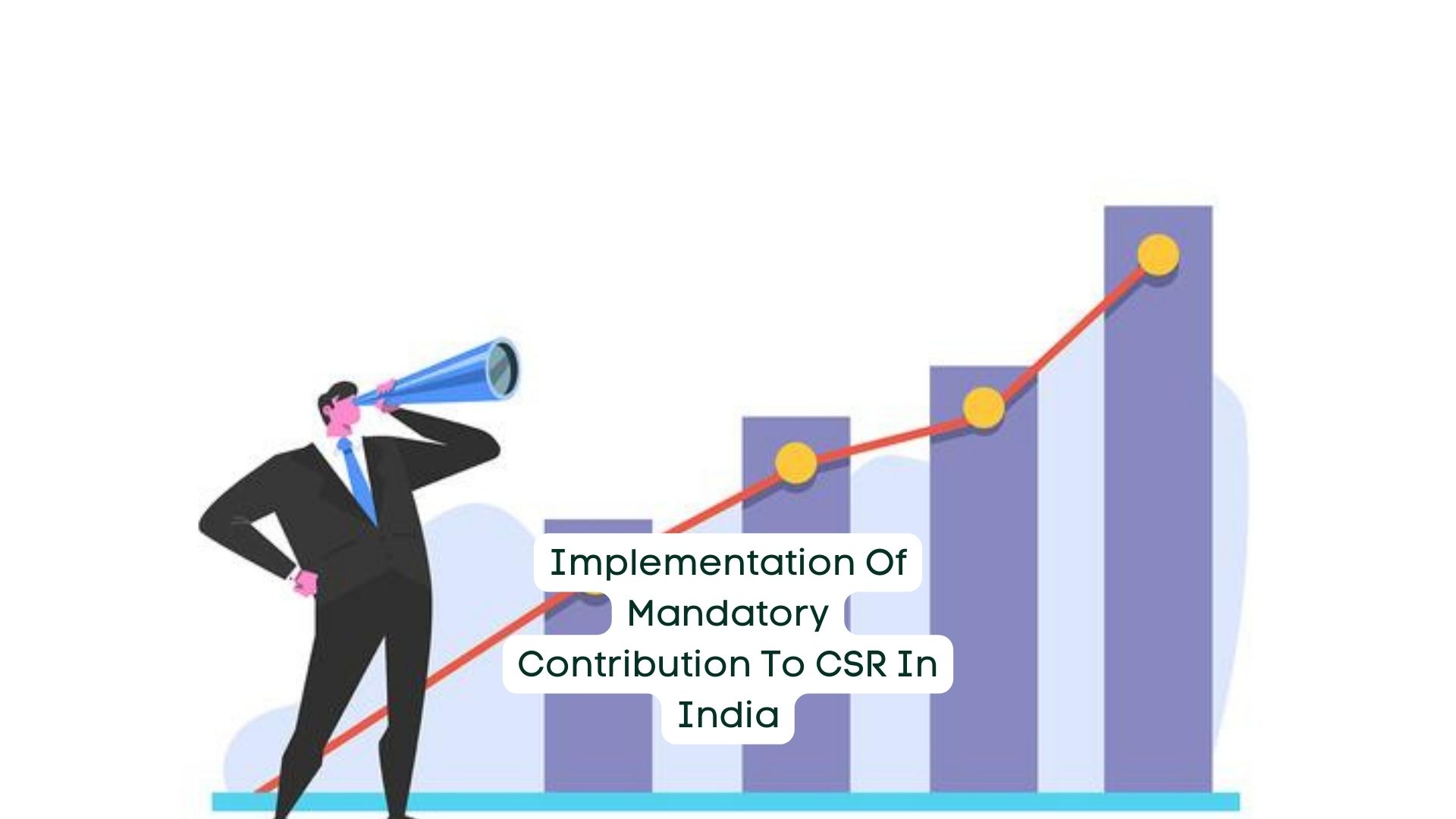
24 Feb Implementation of Mandatory Contribution to CSR in India

India underwent a significant shift towards embracing social responsibility more comprehensively following the issuance of a new directive in January 2021, which underscored that Corporate Social Responsibility (CSR) became obligatory and legally binding. Back in 2014, Section 135 of the Companies Act had made it mandatory for all companies meeting certain financial thresholds, including net assets of Rs 50 billion or more, sales exceeding Rs 1,000 crore, or net income surpassing Rs 50 billion in the preceding fiscal year.
Conceptualization of CSR
Corporate Social Responsibility (CSR) stood as a self-regulating business approach aimed at fostering companies to become more socially responsible towards their stakeholders and the broader community. By embracing CSR, also termed “Corporate Citizenship,” companies aimed to comprehend their impact across various sectors of society encompassing the economy, societal well-being, and environmental sustainability. Engagement in CSR implied that companies would conduct their business operations in a manner that contributed positively to society and the environment, refraining from detrimental impacts.
Thus, the spectrum of Corporate Social Responsibility encompassed a diverse array of practices that could benefit the surroundings of the business, contingent upon the prevailing environment and industry. Consequently, companies could enhance societal value by endorsing their brands through CSR endeavors, philanthropic initiatives, and volunteerism.
The positive outcomes of CSR initiatives on both businesses and communities were discernible. Such initiatives served to strengthen the bond between employees and businesses, fostering morale and engendering a heightened sense of connection to the broader world.
Categories of CSR
Numerous companies acknowledged the significance of socially responsible actions for their clientele, employees, and shareholders, directing their focus towards various CSR categories:
- Sustainable Initiatives: Environmental stewardship constituted a primary focus area for CSR efforts. Corporations, irrespective of their scale or structure, wielded significant influence on carbon emissions. Any measures adopted by corporations to mitigate their carbon footprint stood to benefit both the business and society, earning societal respect in the process.
- Humanitarianism: Companies could contribute to CSR through donations, provision of goods, or other forms of support to charitable organizations. Leading companies often extended substantial resources to support local charities and community initiatives, thereby accruing goodwill. Although more challenging for smaller enterprises, they could still make meaningful contributions at individual levels, which could collectively yield substantial impacts.
- Ethical Labor Practices: CSR could manifest through companies ensuring fair and ethical treatment of their workforce, particularly pivotal in labor-intensive nations like India and other developing economies.
- Contributions: Participation in charitable endeavors or volunteering time, both individually and through employees, at public events spoke volumes about a company's sincerity. By engaging in benevolent acts without expecting reciprocation, companies demonstrated concern and support for various social causes.
Mandatory Corporate Social Responsibility
While the concept of mandated contributions towards Corporate Social Responsibility (CSR) might have been novel, the notion of social responsibility had longstanding roots in Indian societal ethos. Across various faiths, distinct ideologies and beliefs underscored the importance of social responsibilities in diverse contexts. Hinduism, for instance, encapsulated the concept of “dharma,” emphasizing an individual’s obligation towards society. Similarly, Sikhism propagated “Vand Chakna,” advocating for the sharing of one’s earnings with others, while Islam mandated “Zakat,” a form of obligatory charity directed towards societal welfare.
Despite the historical voluntary nature attributed to CSR, a paradigm shift had occurred over the years, with an increasing number of nations enacting legislation mandating firms to engage in CSR activities.
Corporate Social Responsibility Under Section 135 of Companies Act 2013
The amendments introduced under the Companies Act of 2013 in 2014 positioned India among the pioneers in legally mandating CSR provisions. These provisions necessitated corporate entities to allocate a portion of their revenues towards addressing critical social issues such as rural development, healthcare, sanitation, education, and environmental sustainability.
Applicability
The CSR requirements extended to:
- Every business entity
- Its parent company
- Its subsidiaries
- Foreign corporations meeting specified financial thresholds in the preceding fiscal year
Utilization of CSR Funds
Companies were obliged to allocate at least 2% of their average net profits over the preceding three fiscal years towards CSR endeavors annually. For companies not having completed three fiscal years, the average net profits of the preceding two years served as the basis for calculation.
Unspent Funds
Any unutilized funds from CSR initiatives were mandated to be transferred to a specified fund within 30 days before the end of the subsequent fiscal year. Furthermore, it was incumbent upon companies to utilize these unspent amounts for designated CSR projects within three fiscal years from the transfer date, failing which, the funds would be diverted to funds prescribed under “Schedule VII of the Companies Act,” including the “Clean Ganga Fund,” “Swachh Bharat Kosh,” and the “Prime Minister’s National Relief Fund.” Any unspent amounts not earmarked for operational CSR initiatives were to be directed to a reserve specified in Schedule VII within six months of the relevant fiscal year’s conclusion.
Penalties
In instances of non-compliance with Section 135, corporations and culpable executives faced penalties ranging from Rs 50,000 to Rs 25,00,000. Additionally, individuals found guilty could face imprisonment for up to three years.
Conclusion
CSR embodies a company’s acknowledgment of its responsibilities towards stakeholders, the environment, consumers, employees, communities, and broader societal interests. A thriving business necessitates a stable society, hence it is incumbent upon companies to provide goods and services that benefit society. Moreover, societal recognition and endorsement are pivotal for a business’s sustained success, thus underscoring the importance of aligning business interests with societal welfare.


No Comments